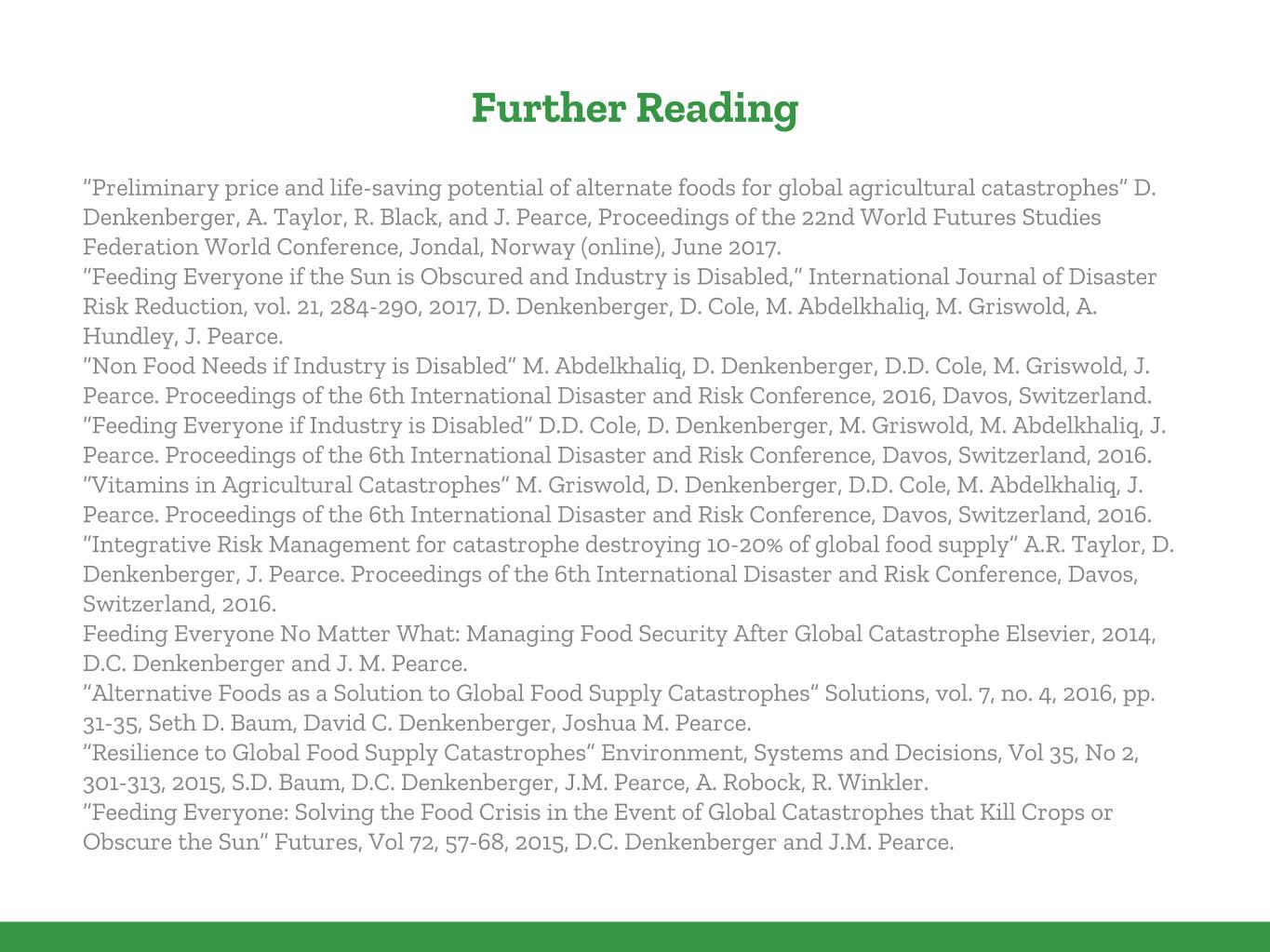Articles
Loss of Industrial Civilization and Recovery (Workshop)
Loss of Industrial Civilization and Recovery (Workshop)
A powerful electromagnetic pulse, solar storm, or narrow AI virus could leave large portions of the globe without electricity. As a civilization, are we prepared to handle challenges of this magnitude? And if not, can we become prepared? This workshop from EA Global 2018: London, led by David Denkenberger of ALLFED, deals with these questions.
A transcript of the workshop is below, which has been lightly edited for clarity. You can share your thoughts on the EA Forum.
Intro
First I'll give some intro, and then we'll break into small groups. You'll discuss the scenario that I give you, about how people would deal with a major catastrophe. Then I'll get into how it might be different if we actually prepare for these catastrophes, and then your groups will discuss what you think would happen. Then we'll come back together and discuss results.

A little background on Alliance to Feed the Earth in Disasters: many people on our team are actually in the UK, and other people are in the US. We started with the book Feeding Everyone No Matter What.
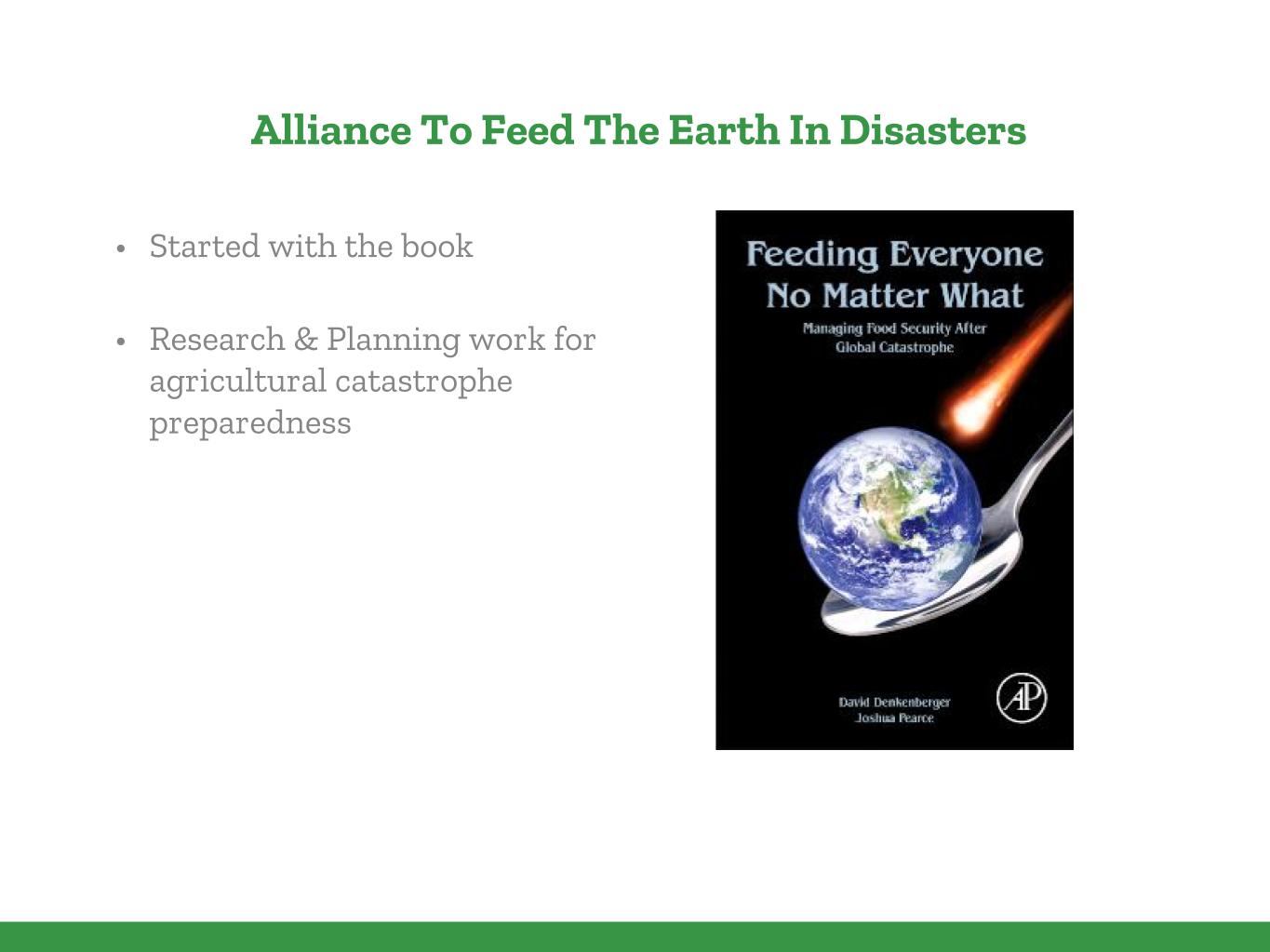
We're looking both at the research side and also the real world practical preparedness and planning. Some more background on what ALLFED does, if you look at a spectrum of global food production shock, most effort is on catastrophes or disasters that only have a roughly 1% loss in food production, like what happened in 2007, 2008. So we don't focus on that.
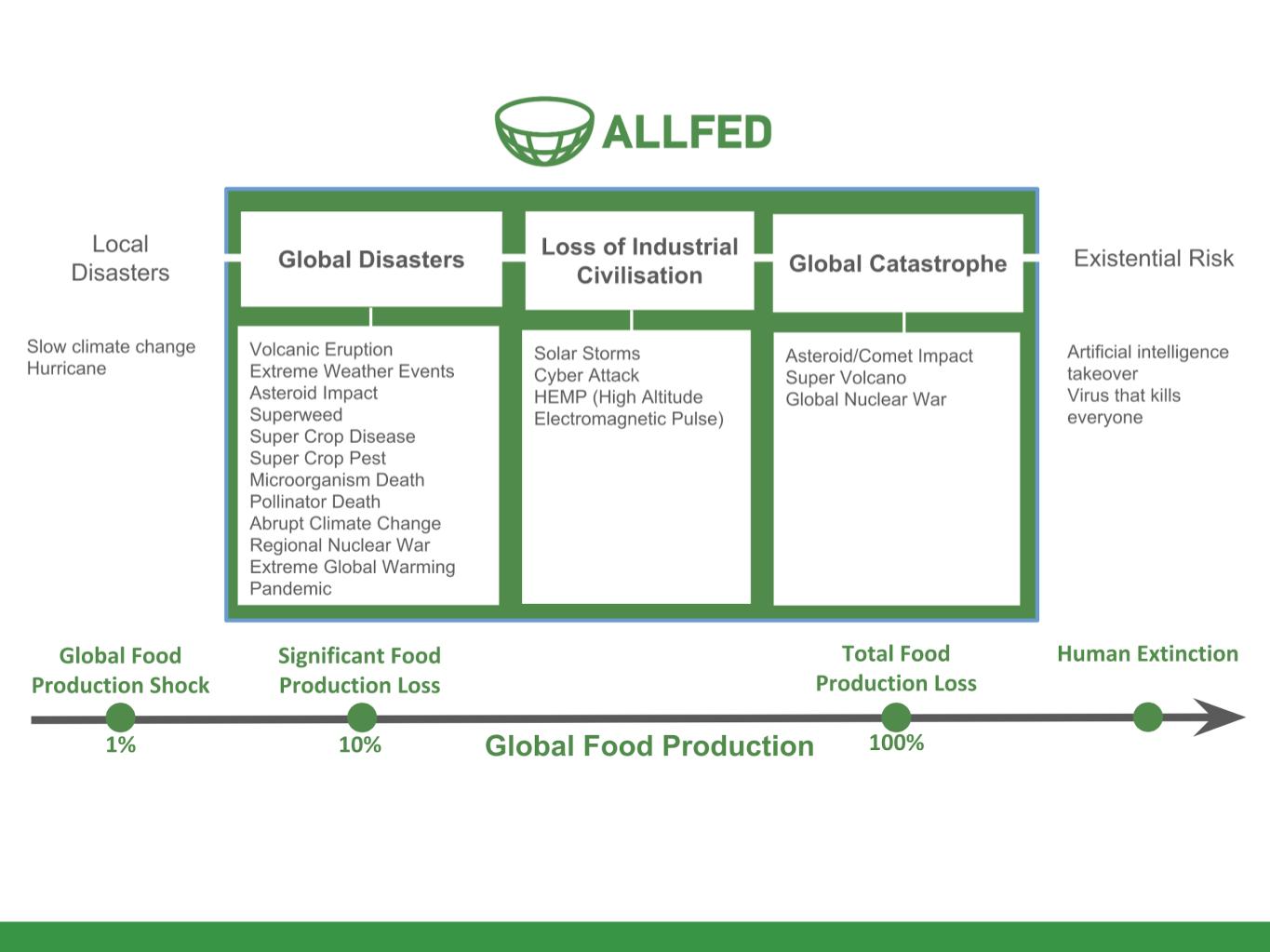
We do focus on scenarios that could cause a roughly 10% reduction in food production, so these are things like volcanic eruption, like the one that caused the year without a summer in 1816, where there was famine in parts of Europe. There are also a number of other disasters that could cause a major food reduction, like a super weed. Then we also look at disasters that could completely block the sun, like nuclear winter. Today, we'll focus on scenarios that could disrupt electricity. Since pretty much everything else is dependent on electricity, like pulling fossil fuels out of the ground, this scenario could possibly entail a collapse of industrial civilization.
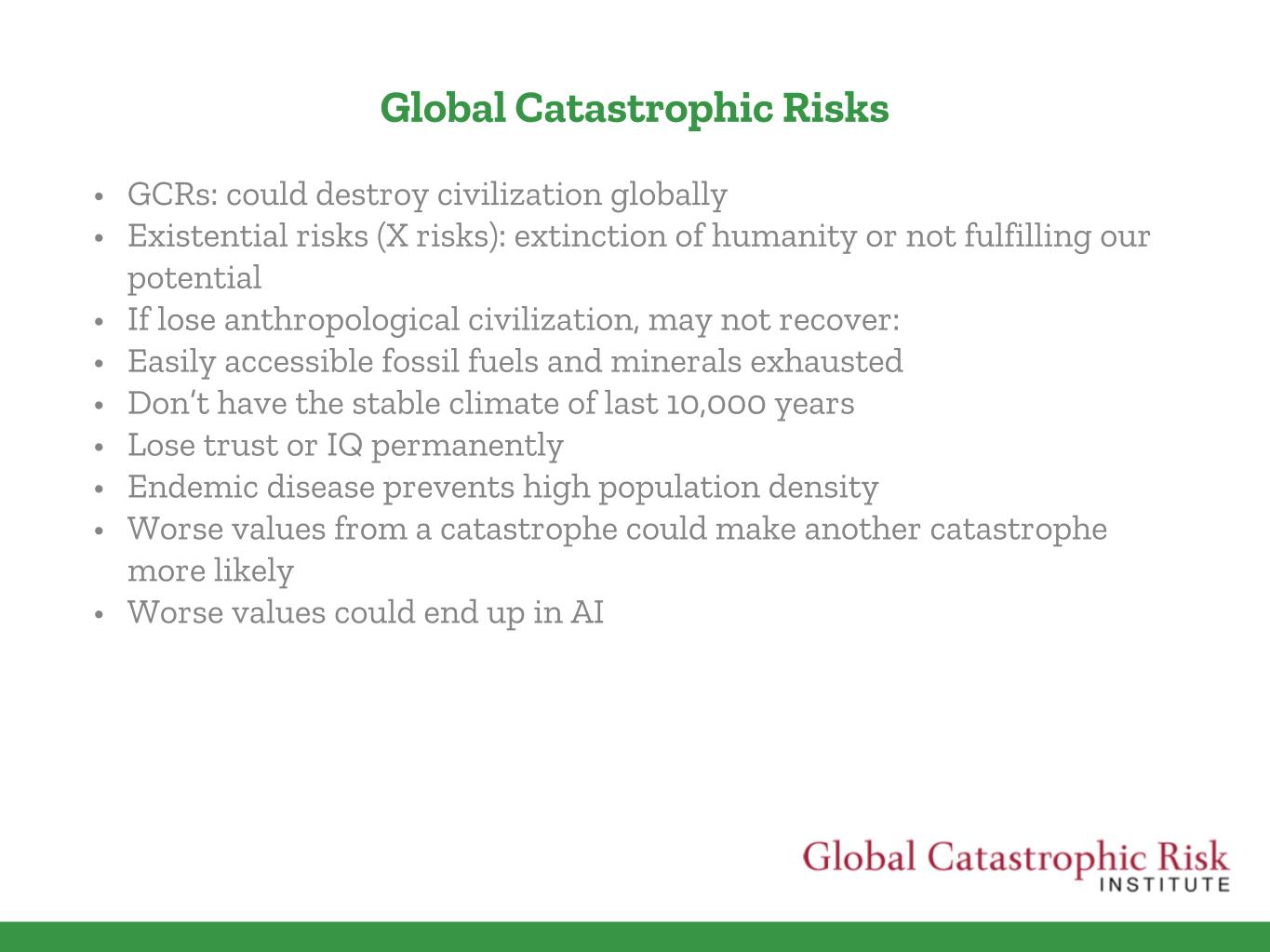
The emphasis within EA has been on existential risks, which many times people associate with outright extinction. The agricultural catastrophes we'll be talking about are unlikely to cause outright extinction. However, the original definition of existential risk from Nick Bostrom was not just events that could cause extinction, but also ones that would cause a significant reduction in the potential of humanity in the long term. So if one of these global catastrophes were to destroy civilization, and we didn't recover from it, that actually would constitute an existential risk, because we have not attained our potential as humanity. There are a number of reasons why, if we lose civilization, we might not recover it. For instance, we've already burned the easily accessible fossil fuels, and fossil fuels were important in creating industrial civilization. We've also had a stable climate for the last 10,000 years, while we might not be so fortunate in the future. And then, another possible way of having far future impact is that if one of these catastrophes happened, and things went poorly, then the trauma from the catastrophe could make us nastier, and maybe we'd be more likely to have future catastrophes. Or maybe worse, post-catastrophe values end up in an AI, and are locked in. So preventing catastrophes are another way of having far future impact. All right. So that's background on Global Catastrophic Risks and ALLFED. Now I'll quickly go over the scenario.
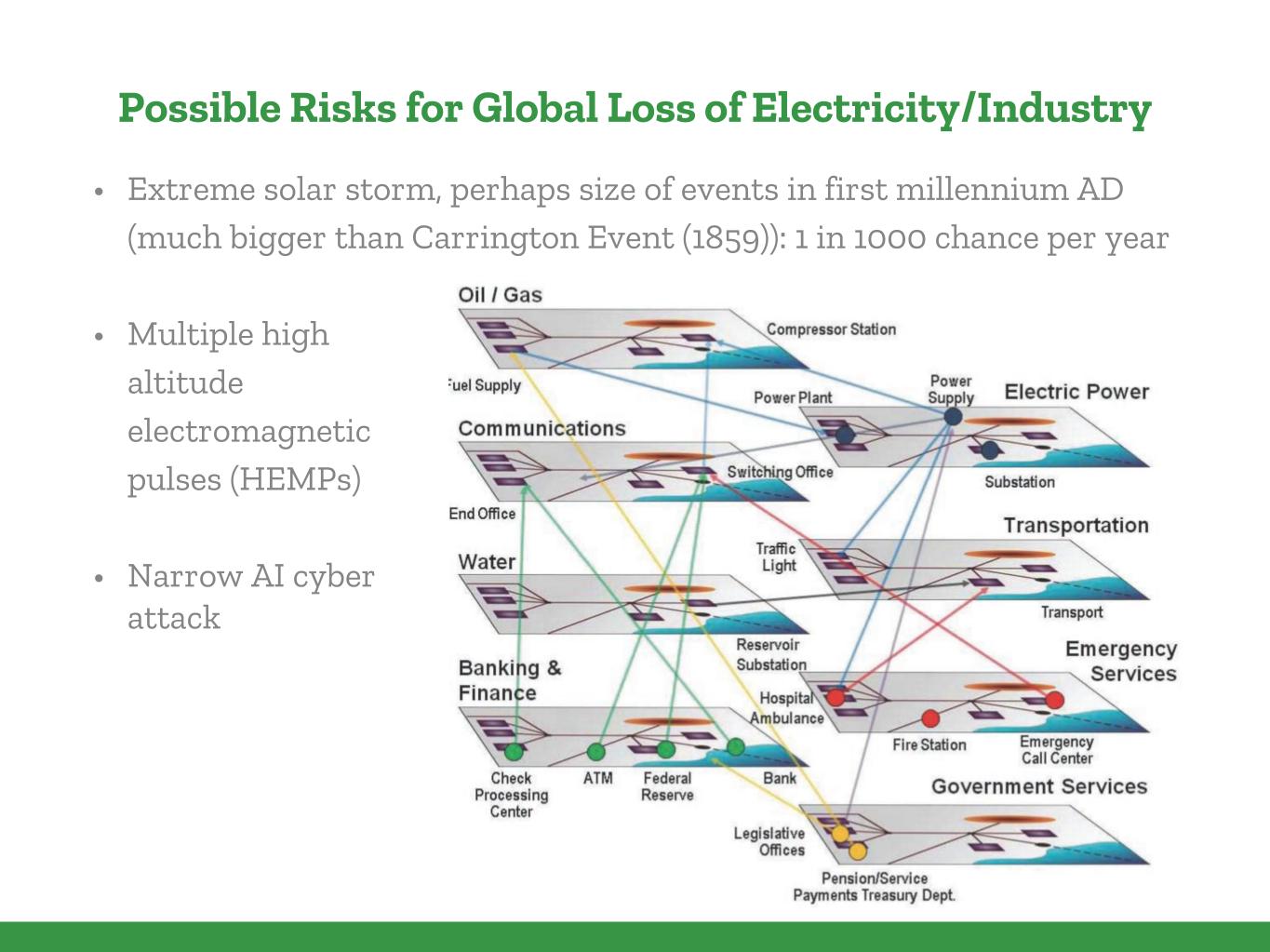
So we've mentioned solar storms. A major solar storm happened in 1859, the Carrington Event, when we basically only had telegraphs. We didn't have much electricity, but the storm did disrupt telegraphs. In order to disrupt electricity globally, it would have had to be a more severe event. But there actually have been more severe events than what happened in 1859, two of them in the last 2000 years. A solar storm would burn out transformers connected to long electric lines. The next scenario is the high altitude electromagnetic pulse. A nuclear weapon detonated at high altitude would create an electromagnetic pulse. There, you destroy not just transformers, but pretty much anything plugged into the grid. So like computers would be fried, and even large vehicles. Most of the emphasis is on just a single electromagnetic pulse. But if there were multiple around the world, it could potentially disrupt electricity globally. Then the third category that could disrupt electricity globally is a narrow AI cyber attack, or computer virus. One computer virus already did disrupt electricity locally.
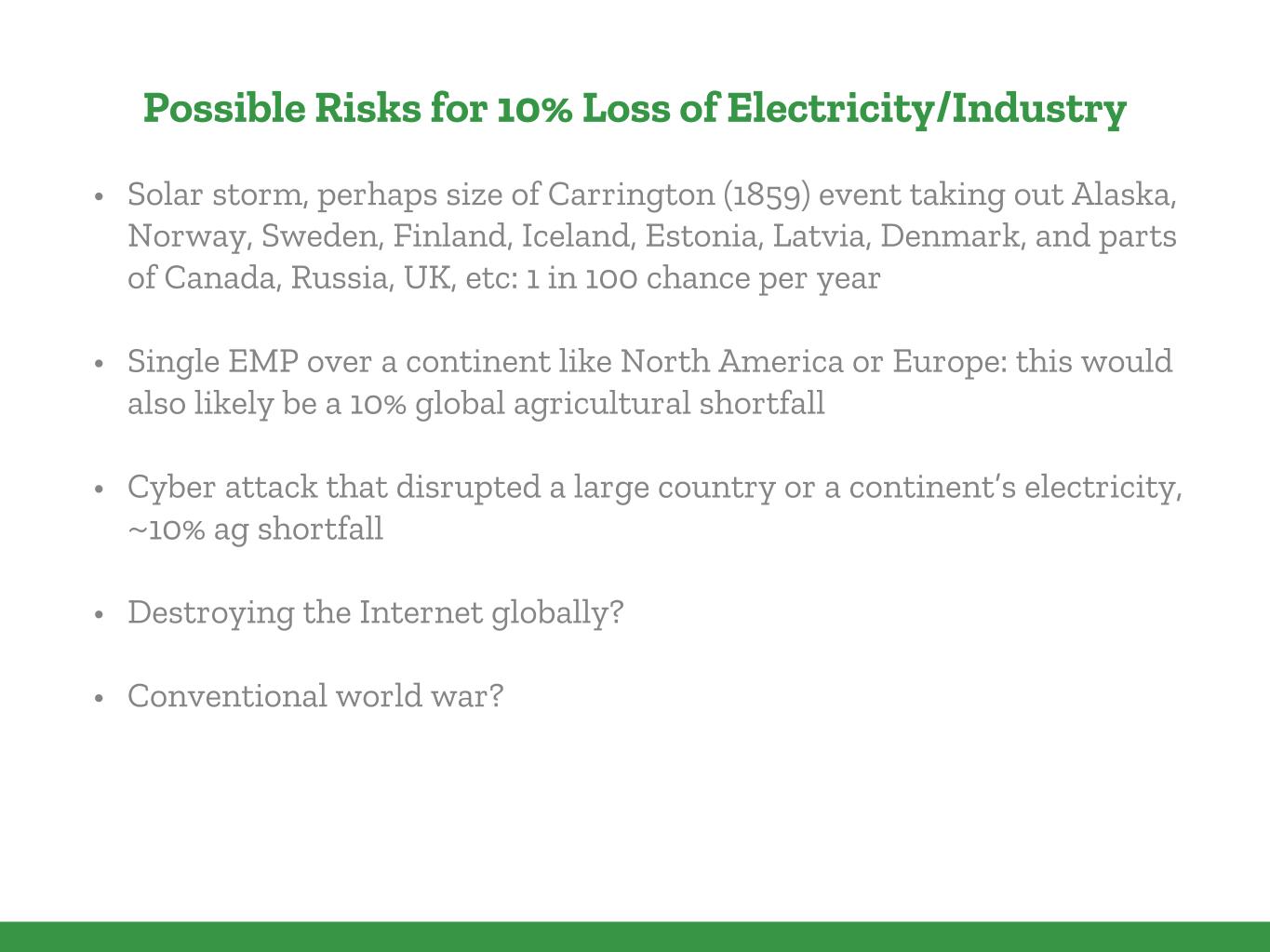
But actually, for today, we're going to focus on what we call the approximately 10% loss of electricity and industry scenario. So we're talking about something around the size of the Carrington Event. Solar storms tend to affect the high latitudes more strongly. So it might be that high northern countries, or states, in the case of Alaska where I live, or Norway, Sweden, Finland, Iceland, Estonia, Latvia, Denmark, maybe parts of other countries, could have their electricity disrupted. That might be around a one in 100 chance per year. Or, we could have a single EMP, like over North America or Europe, and you would not only lose roughly 10% of your industrial capability, but those areas produce a lot of food. As you'll see, if you don't have industrial agriculture, you can't produce as much food. So it's likely to be a 10% reduction in global food production at the same time.
Similarly, a cyber attack could affect a continent instead of globally. There has also been some talk about attacks that might be aimed at disrupting the internet, and if we lost the internet, it wouldn't be as bad as losing all of electricity, but still many processes are dependent on the internet. So this could be something like a 10% disruption in our industrial capability. Then finally, if we had a conventional World War that did not go nuclear for some reason, that could be a 10% destruction of industry. Here are some pretty pictures of the five scenarios.
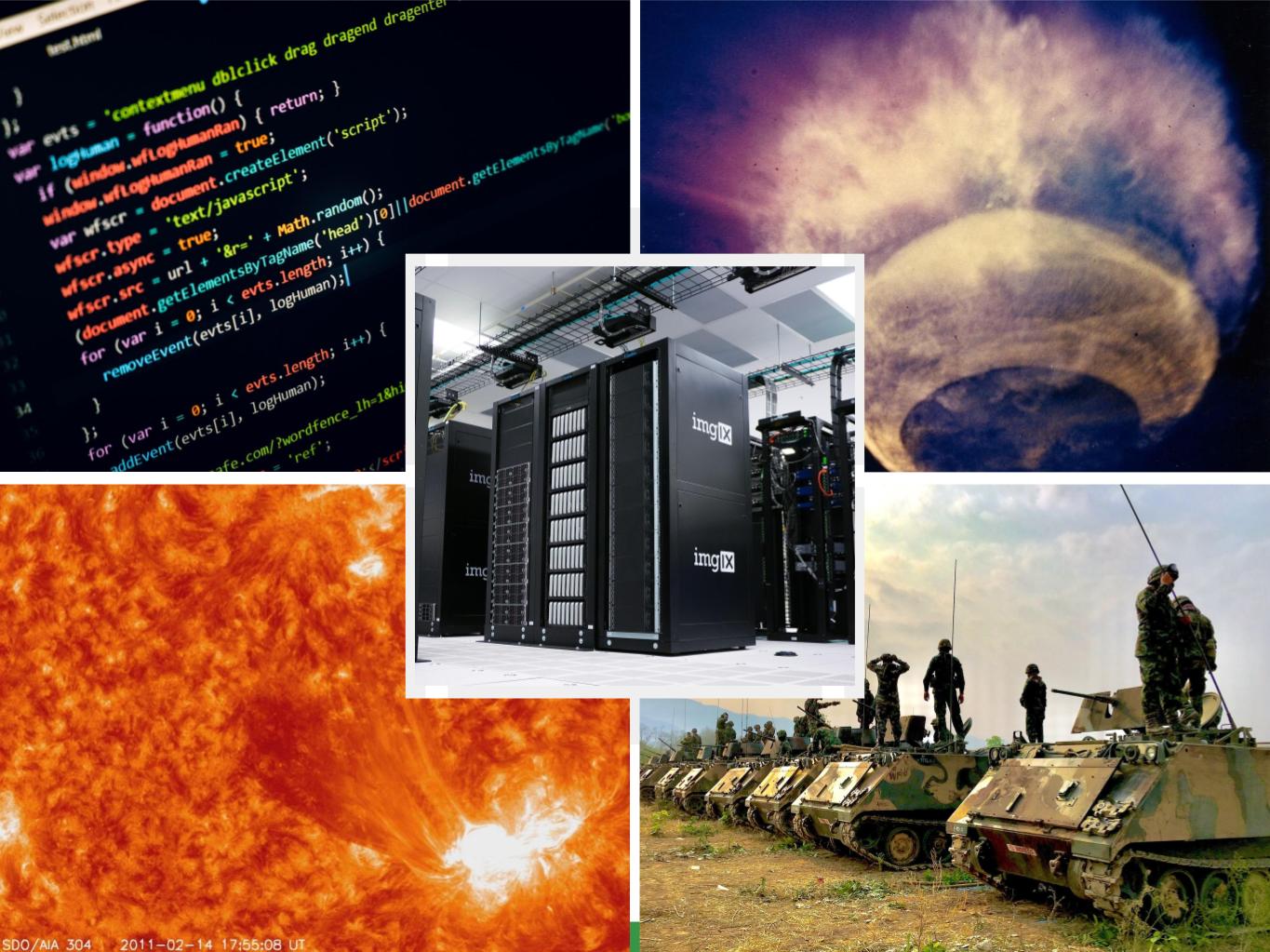
Okay. So now, for your small group work, we're going to focus on just one particular scenario. Let's say we have an EMP over Eastern United States, the electrical grid is destroyed, plus all the electronics that are plugged in. We can't pull fossil fuels out of the ground, we can no longer pump it through pipelines. They've actually done some testing to simulate EMP, and they found that larger vehicles tend to be destroyed by it, so larger vehicles won't work. But smaller vehicles would still function, if they can get fuel. But we have a problem with fossil fuel production and refining in this scenario. Also water distribution and waste water treatment would stop. Then from an agricultural perspective, it is possible to farm by hand, but in the United States, we might only get one third as much food out of the same land that we do right now.
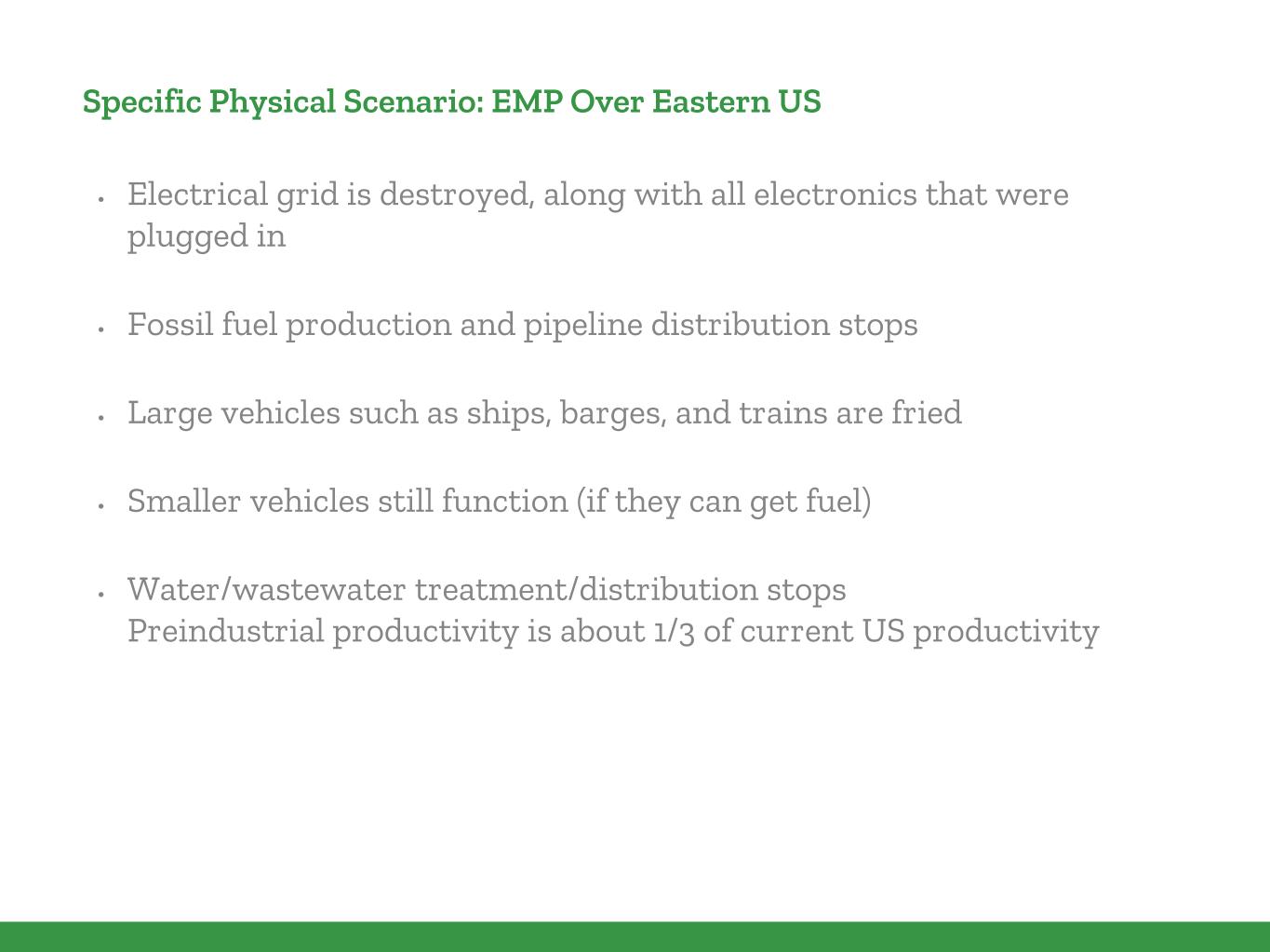
So here is an example of what an electromagnetic pulse over the US might look like. This is the intensity of the volts per meter. We won't get into the detail. So probably, it would probably be centered over the Eastern US, because there is more industry there, and there are more people. Generally, the EMP doesn't harm people directly, but as we've seen, it greatly damages infrastructure.
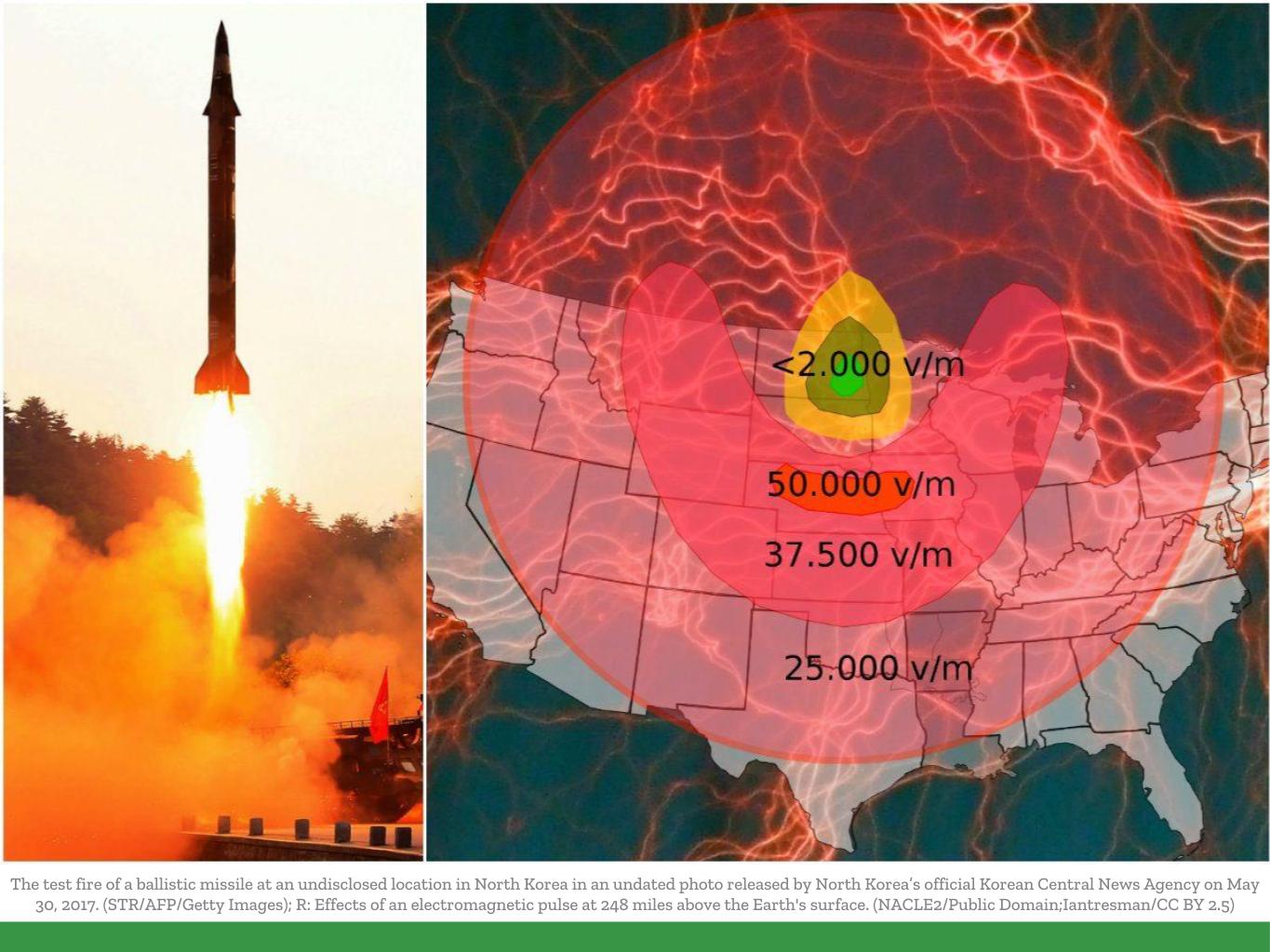
So, now we're going to break up into groups. What would be great is if each group does have someone with a laptop to kind of record ideas, or you can do it on paper if you want. But it's great if you do record on a laptop, then you can send it to us, if you feel comfortable. We're always interested in what people come up with.
For this first scenario, we're trying to think what might happen if we don't do any preparations. Take about five minutes, then each group can present their results.
Some questions to think about are: What would the reaction of other countries that still have industry be? Would it mean that they would help out? Would they not interfere at all? Or would they actually conquer, like take over? Then also, think about in this scenario, how much of a far future impact do you think it would have? Because it happens, how much reduction in far future potential of humanity do you think might happen? This can be what we call cascading failures, like, the initial scenario, if it goes poorly, then that could have long term impacts.
If you want to follow along with the workshop, take five minutes to think through these questions before reading on.
Group Responses to First Scenario
Group One: In this group, we have more questions, so we tried to outline our ignorance. The topics that we discussed immediately were, would other industrialized nations jump up to help? A lot of questions revolved around, can they help? Other examples, how fast can you put food in the US if you really were short by half or one third of the production? Other thing that we discussed is how fast and in what conditions does the order of society break down? Is the local state able to keep control over the people before they riot, before criminal organizations take critical parts of the political infrastructure under their control? We also discussed differential effects of how this would affect people from different social classes. So we have ignorance about the situations, but that's what came to our minds.
Group Two: We talked about whether anybody would actually send aid to the US, and Canada, and potentially Mexico as well, given that we've got approximately two UK populations on the Eastern seaboard alone that would be without power. Would there be rioting? Would other countries actually send any aid to help? There is going to be spoiling food everywhere. One suggestion was that the US could sell somebody else an aircraft carrier in order to get aid back, which I thought was quite interesting.
Group Three: We first talked about whether anyone would invade us, and we concluded probably not, because the Western US is still going to be up and running, we assume. We have aircraft carriers and stuff, so we're not at risk of being invaded, basically. The big hazards after electrical shutdown would be like anything like chemical processes, nuclear power plants. Those might not be such an issue, because the graphite rods would drop into them. But there would be big risks of fire, because fire engines might be knocked out, and the EMP would maybe cause fires, even. So that might be a very big current risk. I think that's what we got to, and chemical storage leaking, that sort of thing.
Group Four: Okay, so we were talking mainly about two areas. The first question is, as mentioned, is the government going to stay in control? Are people going to freak out? Is the military going to be able to keep control of the East Coast? We assume the military infrastructure will probably stay functional, because you might think that they are at least in part prepared for these kind of scenarios, and the command infrastructure would stay stable. But would they be able to keep control of other civil society? Or will that be a problem? Second question is would communication infrastructure still work? So we'd assume that probably civil, again, the normal communication infrastructures would break down, which would be a big problem. But maybe, again, that's on the military, maybe they will be able to kind of jump in and build up new communication and new ways of communication.
Group Five: In our group we talked a lot about the short term impacts, meaning immediate communications, and how people react, because we wouldn't actually probably know what's going on, given the issue. Also, a lot of fleeing. I think once people do understand what has happened, and where it's happened, we'll see people trying to get out of the East Coast areas, towards the West Coast. So the West Coast might be logistically impacted, due to the fact that the things in the East Coast will no longer be working. Canada is probably affected as well, massively. Also, cities versus countryside. Countryside is very rural in the United States, physically speaking. Possibly that could be a problem for them from logistics, meaning cities would probably have more attention once aid does come in. But at the same time, depending on the time of year, they would be able to access food maybe locally. But then also, there are spoilage issues and whatnot.
Group Six: We started off as well with communication, and thought about that. We thought that most of military is probably protected against EMPs, so they would have important hardware for communication skills, to reestablish them. We thought of alternatives that work with the mobile phones, because most mobile phones won't be plugged in at the moment of the EMP. So they would last like for another two days, probably. There is a Fire Chat app that connects phones, and is itself a tool that enables people to send messages. You can have peer to peer network between phones through wifi. So you just need to install the Fire Chat app. But you need to do it before the global catastrophe. So maybe one simple thing people could do is to have the Fire Chat app on their phones. Also, we need to charge phones, maybe with mechanical chargers. In that case, people could have communication. Then we had one more technical idea, that nuclear powered submarines wouldn't be affected by the EMP. They could come up, and they have a reactor that could power the cities, or at least some crucial infrastructure. We also thought that maybe aircraft carriers could provide some electricity when they return from other places. But then again, would there be good infrastructure necessary on land, like transformers, to actually convert the electricity from the power plants on the carriers to the local grid? It would depend on the voltage in the ship generators.
Preparation for Second Scenario
I think a lot of good questions were raised, and some good ideas. So we're going to have to move forward to the next section here, where I talk about some of the things ALLFED has been thinking about, in preparing for a scenario like this.
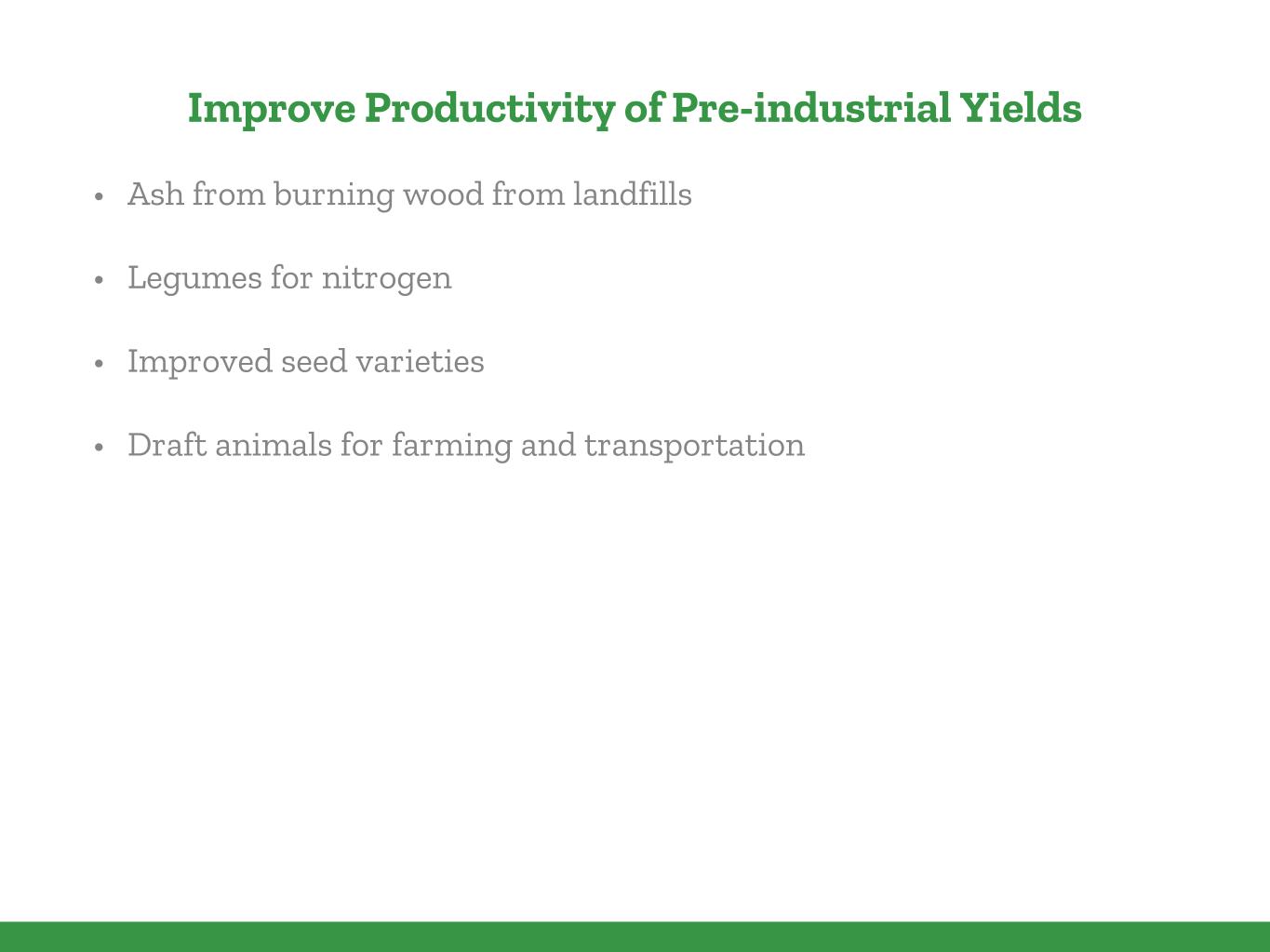
First I'll talk about if there were a global scenario, like we didn't have any industry at all. We have some advantages in getting food out of the land. We understand how fertilizer works, so we can burn wood in landfills to create phosphorus potassium fertilizer. We also would plant a lot of peas, beans, and peanuts, because they fix nitrogen from the atmosphere.
Hopefully we could keep using improved seed varieties that don't rely on continued genetic engineering. We could potentially use farm animals that we currently raise for food, as draft animals and for transportation. I'll talk about that more later. Also, we would ideally shift to types of crops that produce more calories per hectare. We also might rely on alternate foods, which ALLFED researches in our other area of work. We generally define alternate foods as foods that don't require the sun. So these are things like, you can grow mushrooms on agricultural waste. So we might want to do that.
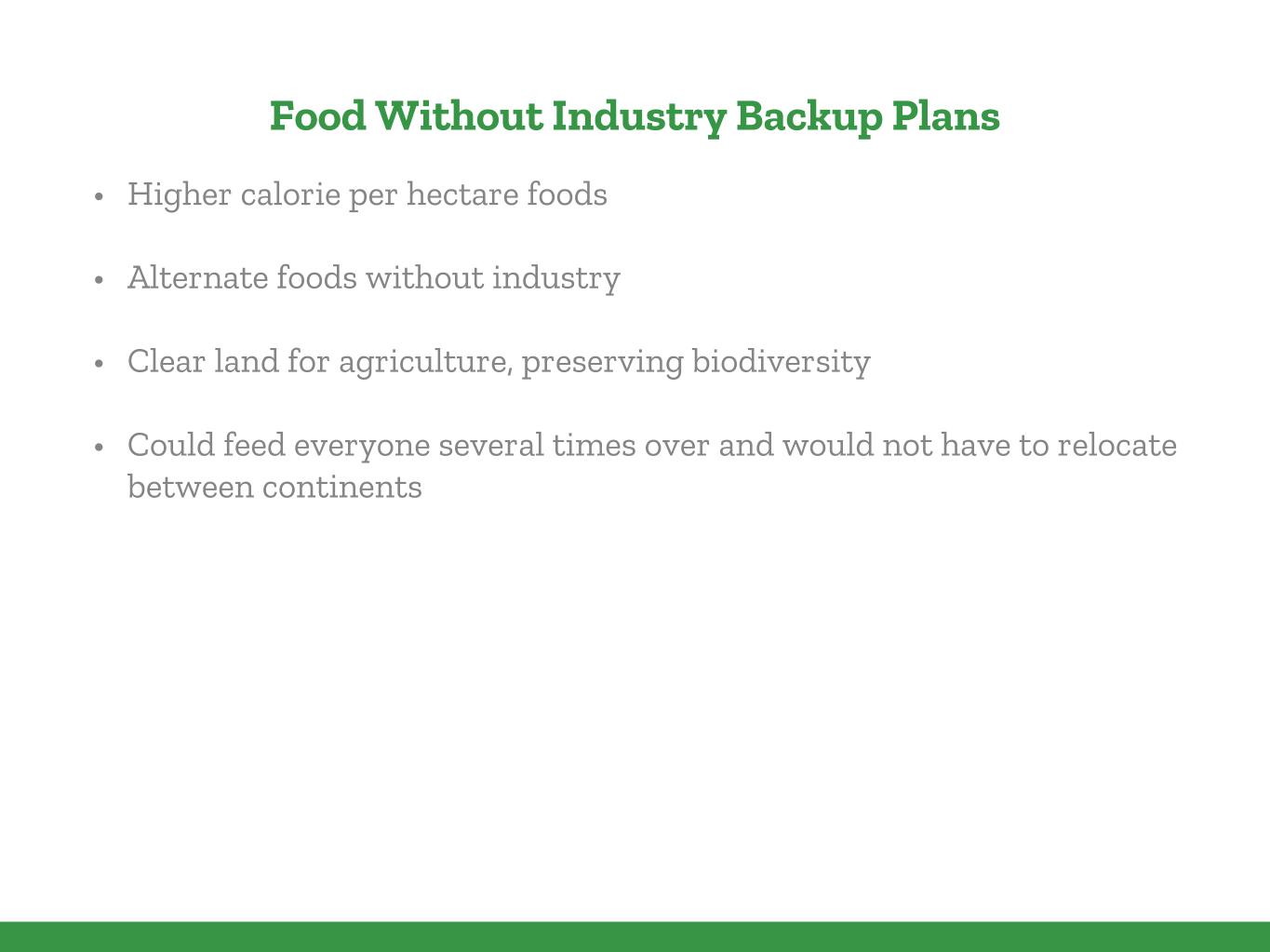
Also we might want to clear more land for agriculture. The problem is that without industry, we don't have chainsaws. So the way of doing it is you would girdle the tree, which means cutting a strip of bark around the bottom, which kills the tree, and then after a year or so it dries out, and then you would actually burn the forest. But, this is a backup plan, and we'd want to do it in a way to limit biodiversity impact. But if we did all of these things, then even though we couldn't get as much food from the amount of land that we currently have in production, we actually could feed everyone several times over.
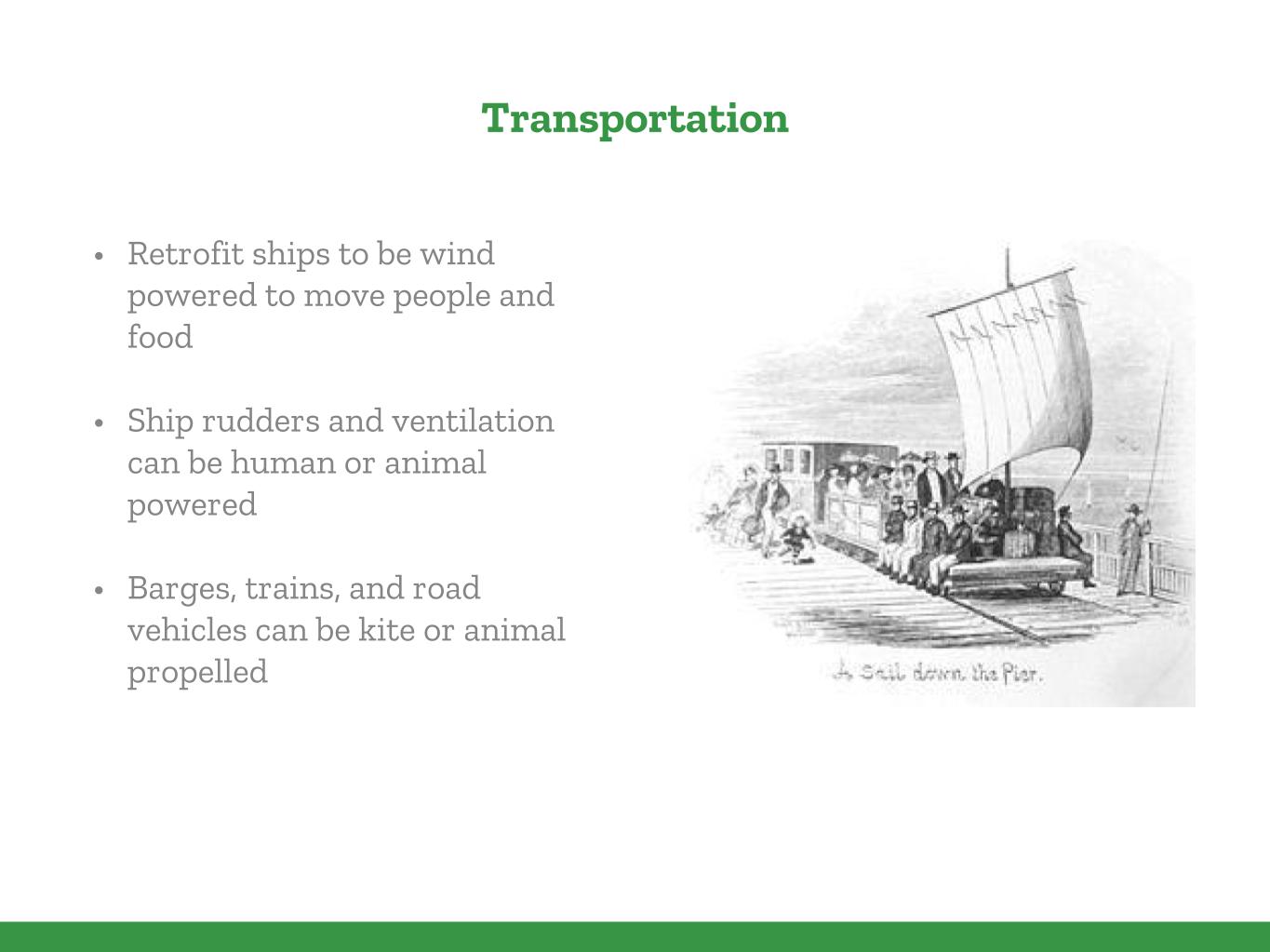
For transportation, of course, ships used to be wind powered. There was even a train here that was wind powered, back in the day. So we would definitely want transportation, because we either want to move food to people or move people to food. They could also be kite powered, which might be better than sails. Then on land, the other option for rail cars is that they can be pulled by cows, one at a time.

But then of course, there are many other needs than food, and we brought up some of these, like healthcare. Of course, the hospitals that are dependent on electricity, you're not going to be able to maintain.
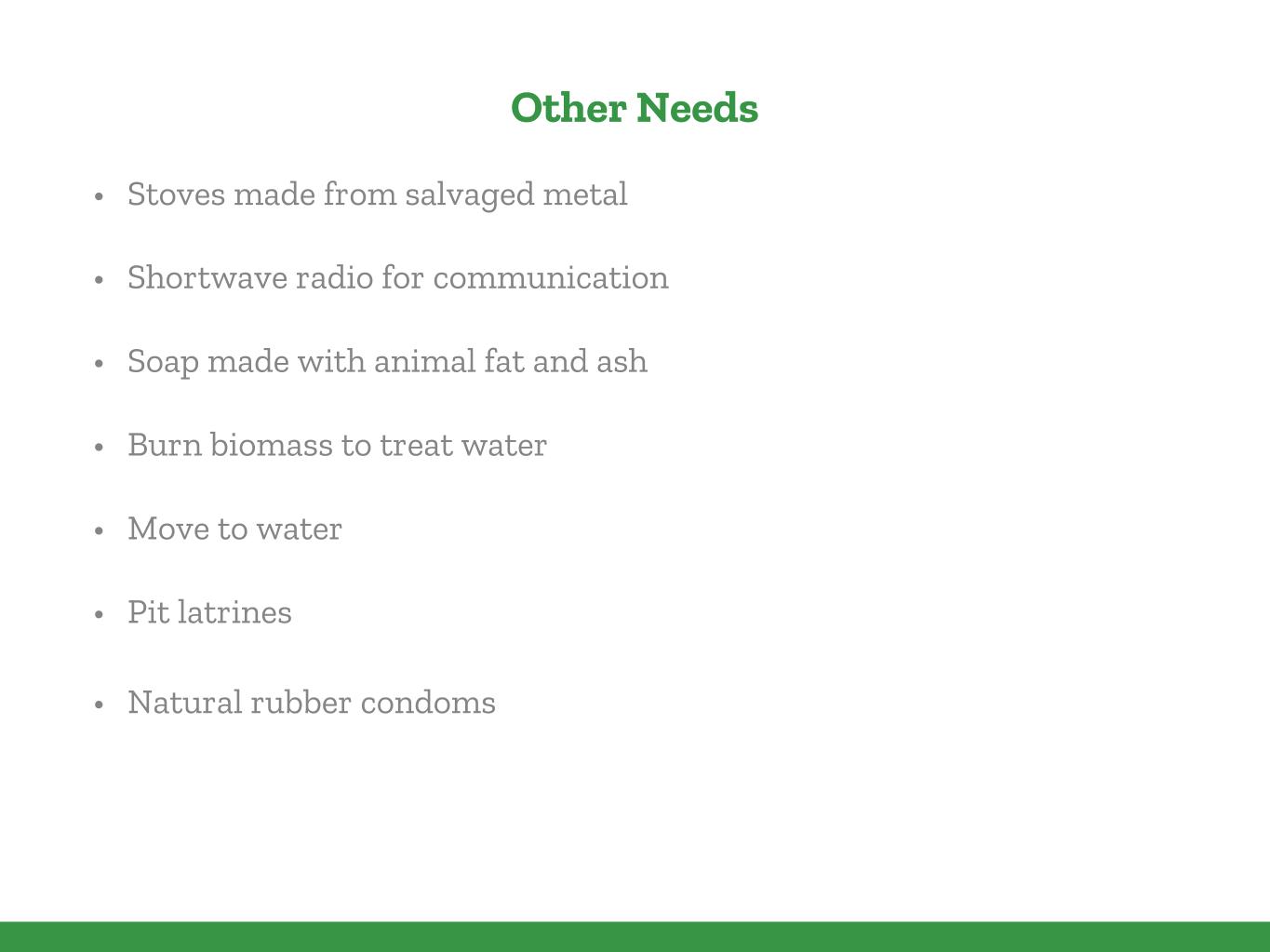
But we do have some advantages over pre-industrial society. We understand the germ theory of disease, that washing your hands is important. We can create soap by combining animal fat and ash, and burn biomass to boil water, to kill the germs. We would need to move to where we can get water by hand. We would need to do sanitation. We could even do some birth control. We need to keep warm, but you can make wood burning stoves fairly easily. Then for communication, there is a short wave radio, sometimes called ham radio, that can be used without large infrastructure systems, and can transmit large distances. Now, many of these solutions that we just talked about, could be relevant even in a 10% loss of industry scenario.
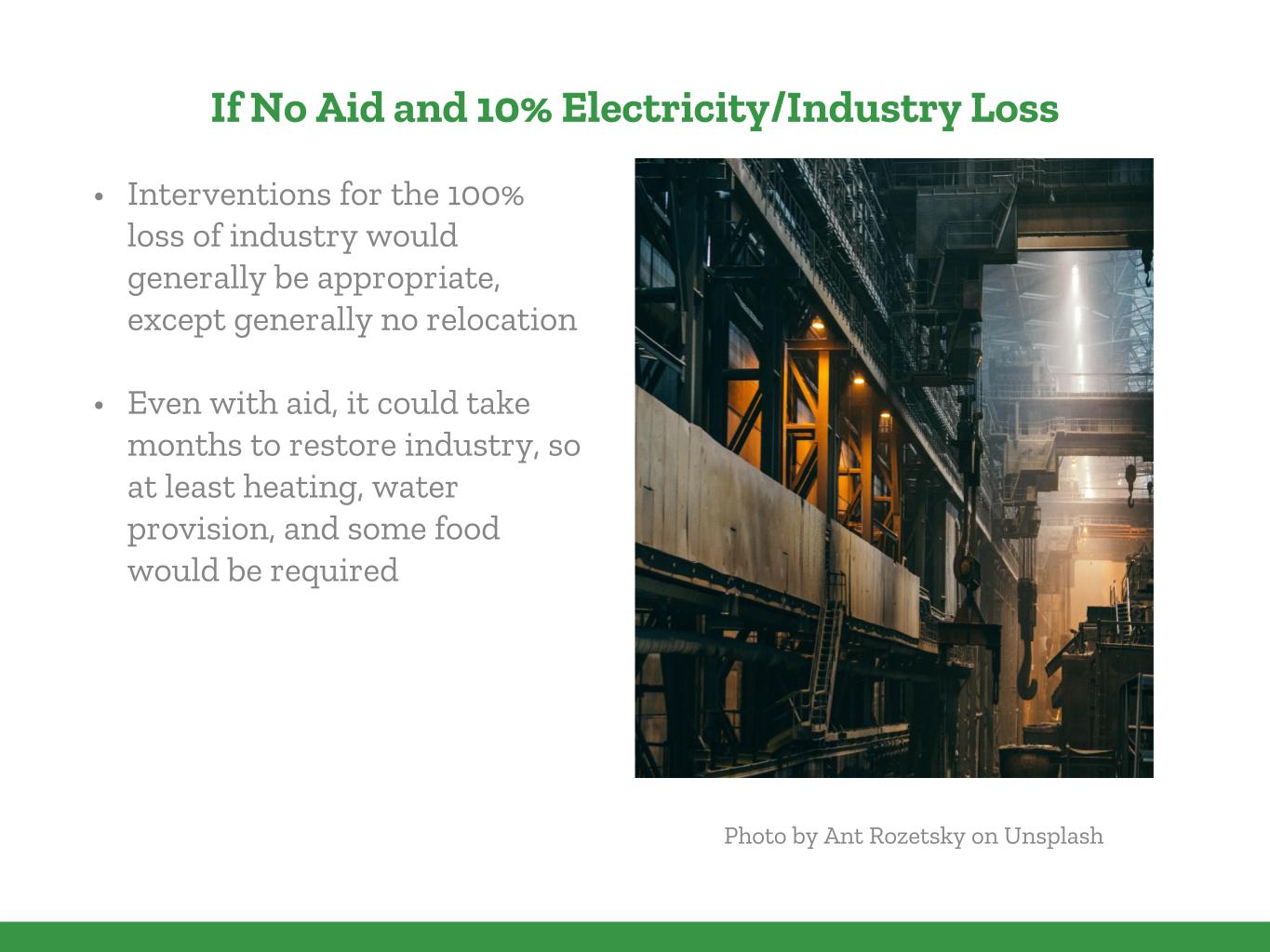
But I think even if there were massive aid from outside, it's still going to take time to restore many services. So we would need to use a variety of strategies. They might involve importing vehicles, also importing the fuel to power the vehicles. One big issue is that cranes for unloading ships, many of them are electric powered. But there are ones that are diesel powered. So if we could move in diesel powered cranes to be able to unload ships, that would be very helpful. Then importing diesel generators, as you mentioned, maybe you have the generator on the ship itself, like a nuclear powered sub or a ship. Then you'd want to import food as well.
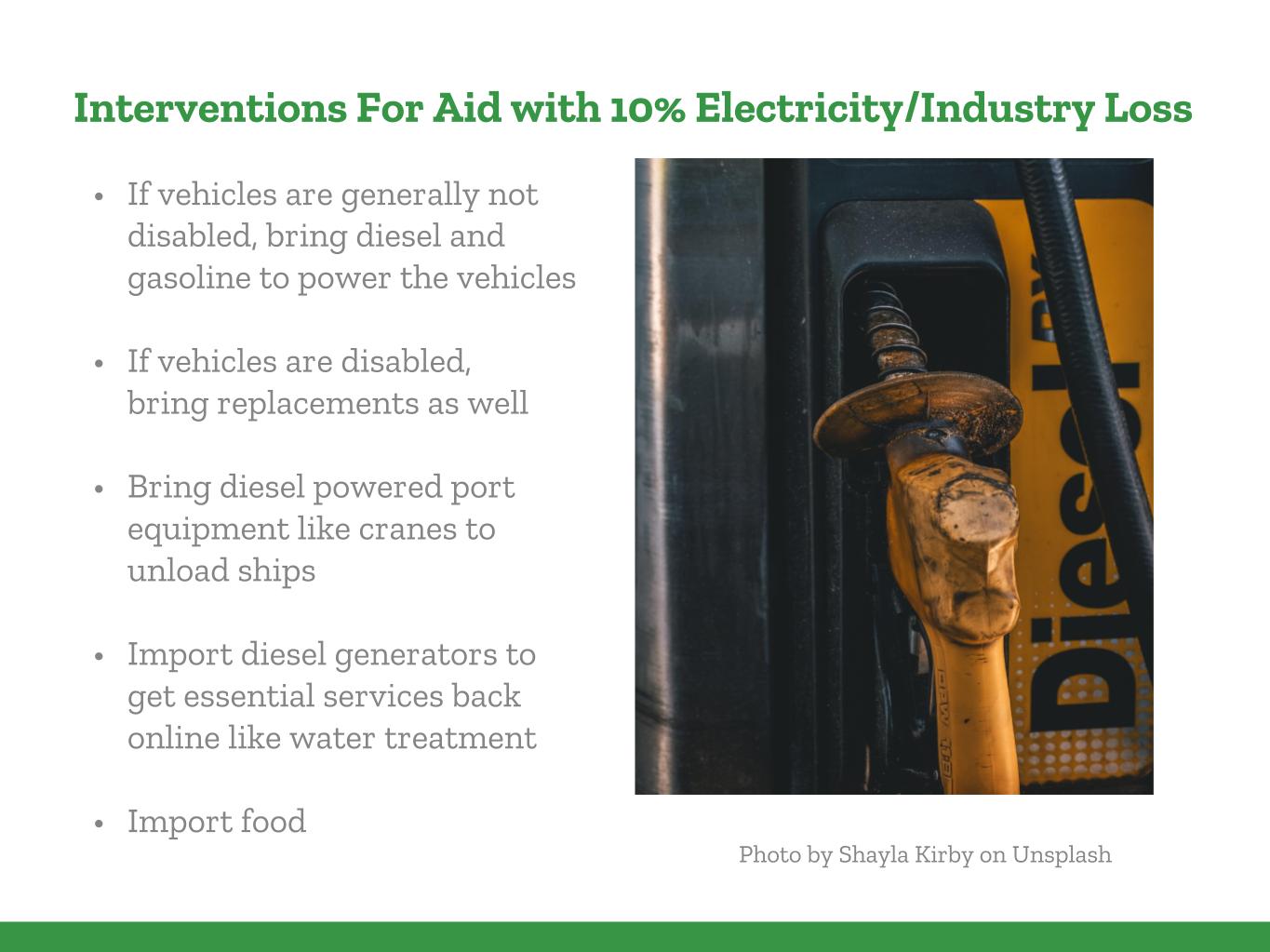
So now the question is, let's think about the same scenario. But let's say we spent say 30 million dollars to actually have some plans ahead of time, we have a short wave radio system that could transmit in a catastrophe, and that we've tested out that even people who live in the city, that don't know how to farm, that we could give them the right instructions to construct tools and actually produce food.
So we'd need to run those experiments, and then modify our instructions. So if we spent that money and got that preparation, now I'd like you to consider that same scenario, and say, well, would it run any better? How much better? Then again, think about how much preparation might reduce the far future impact of a catastrophe.
If you want to follow along with the workshop, take five minutes to think through these questions before reading on.
Group Responses to Second Scenario
Group One: So we were thinking about the preparations for the problem of food and how everyone could have storaged some rice, and we've got an estimate, like 300 kilograms of rice is enough to feed a person for a year. In addition to that, we would have prepared seeds, because you told us we have tutorials how to inform people how to farm for themselves. So with the seeds, depending on what seeds you have and what climate, you can have several harvests a year. We'd have a lot of laborers, because normal jobs in cities are falling away in such catastrophic situations, so at least the problem of finding farm labor is totally manageable. Yeah, that was the basics of our discussion. At the end we tried to make an estimate on how much that would impact the future. We've got a notion that this scenario would be less impactful than the first one, because it's maybe only stalling the development, and not routing our potential.
David: Okay, yeah. I'll mention that we're developing a model, a guesstimate model. So as you have more time to think about it, you'd be able to put in your own numbers to see how various possibilities work out. Now the other thing, I'll just comment quickly about storing food. Yes, it would be great to store a year's worth of food. But then you're talking trillions of dollars if you want to do it globally. So we wouldn't actually be able to afford that. But definitely some of the other things we could do.
Group Two: So we started out, I guess, discussing how effective it would actually be to have distributed this information. We were unclear whether people would actually be able or willing to implement the information they would be given. Maybe more so in rural areas. Even if you've done an education program it doesn't mean that people will effectively implement it. It would be much more effective if local government is still functioning and has some communication capacity, and can still manage that process. The other thing we thought, in terms of food, even if it's possible to have enough food production to feed everyone, there might be distribution issues.
So it might be that cities, there's just too many people and we can't get the food in. So rural areas or smaller towns might be fine. But in cities, it might just not be possible to sort out the distribution problem enough that lots of people don't die first. It's unclear what effects it would have on people's short term reaction, because in some ways, having no idea what's going on is scary. But maybe knowing that the entire Eastern seaboard has gone down is even scarier. But managing the initial stages might be quite important, because actually a lot of damage to infrastructure and the order of society might happen then. If that can be delayed, then maybe you can avoid slipping into chaos, rather than just delaying it.
Group Three: We talked about mainly two things. The first was, so with 30 million pounds, the first obvious observation, like if we talk about US population, we've got about ten pence per person, which is not very much. But the places where we kind of maybe best invest it is to maybe train farmers. If you can't train every person, which you can't realistically talk to every single citizen, then that's probably also not leading anywhere. Maybe go to hotspot places, or for instance, train farmers to train people, and also train people to establish communication systems. There's probably some external aid, because part of the US is still functioning. You would expect probably food supply to be stable, and you would expect there would be fuel and everything. What may be the biggest problem in this scenario, therefore, is actually making sure that the people don't freak out, that people are all right, and that no panic breaks out. That's kind of the most crucial thing in this consideration.
The second thing we discussed was to what extent it's sensible, desired, or likely that people will move from the East Coast to the West Coast, or somewhere else. There would be arguments in favor of doing that, because it's maybe easier to supply them directly in a place where there is working infrastructure. There are disadvantages because if you lose the housing that you already have in the East Coast, maybe there are particular issues with huge amounts of people moving to the west, and to what extent that is going to either worsen issues or help issues. That's the discussion we had.
Group Four: We were talking about rationing supermarket stocks in the short term, and then securing grain silos, and maybe finding a way of processing them properly to provide short term relief. Supplies from the Western United States and Canada, and maybe Mexico, would help. Then getting all the transformers and stuff back online might take a lot longer. But it's going to be high priority. So maybe a global effort on that would be expected.
Group Five: I think the only thing that we've really got to add to that is how much less panic there is going to be. But, there is going to be a lot of time involved in getting people to a point where they actually get new food sources in. Getting people to sort out water supply and getting people moved: who is going to be prepared to let other people come onto their land, of the initial land owners? Would they welcome people with open arms? It seems quite unlikely.
Group Six: Our first question is, we do believe the interventions help to increase people's chances? The mechanisms that make that happen are that centralized organization is better at solving local problems, and then communication in general makes it easier to solve certain coordination problems, like avoid risk aversion by making people actually start doing something as soon as they can. Our point that was touched here was that we believe that water treatment at the levels that we do seems complex enough that it's unlikely to survive. We expect organizations and cities to become smaller. Finally, we think that how delayed scientific progress is might be an interesting proxy for loss to civilization's potential.
Conclusion
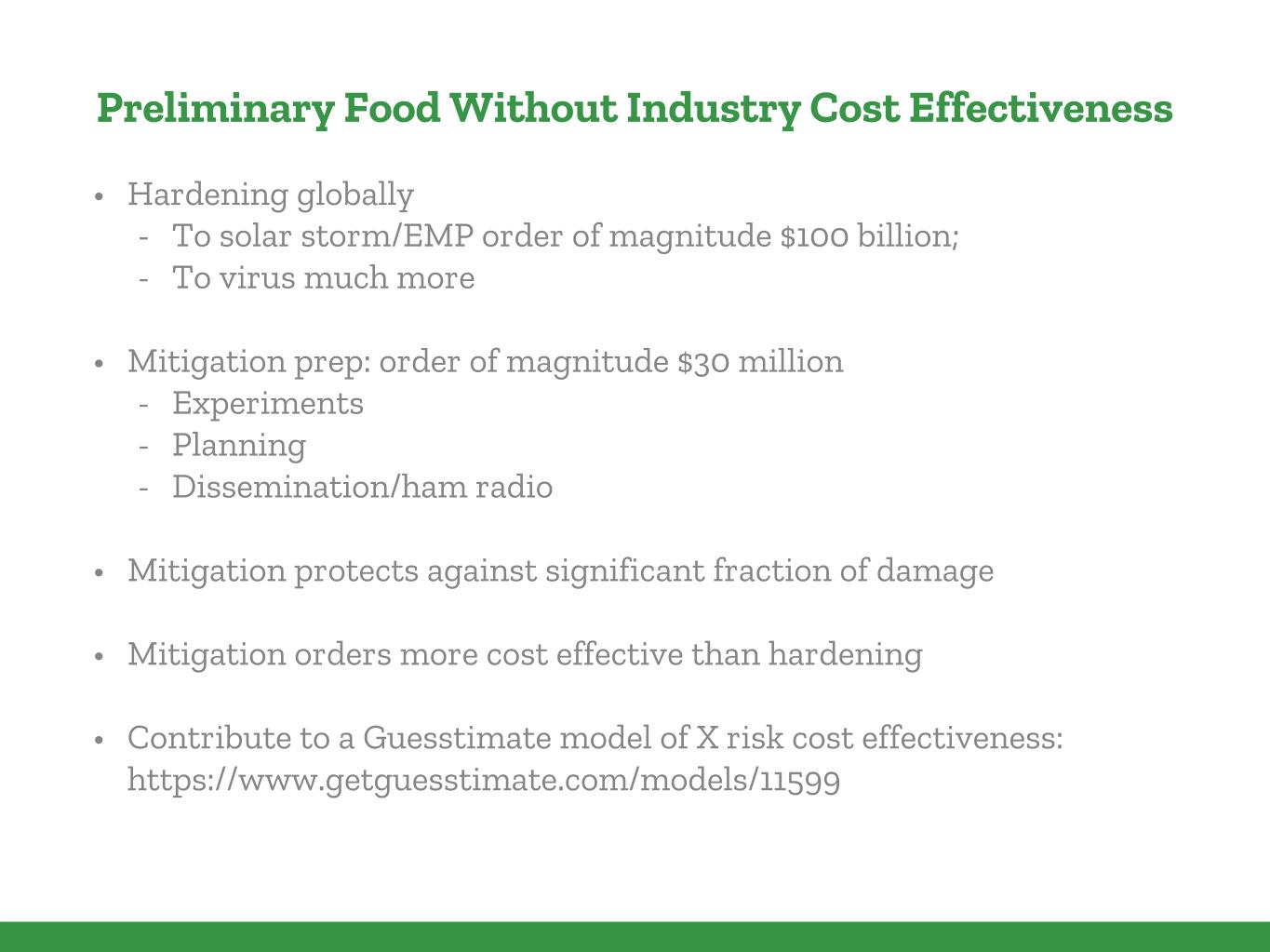
Another way of thinking about how cost effective this might be is that proposals to harden the grid to solar storm and EMP are in the billions of dollars, like 100 billion dollars globally. So of course, that's the ideal scenario, that we prevent the loss of industry.
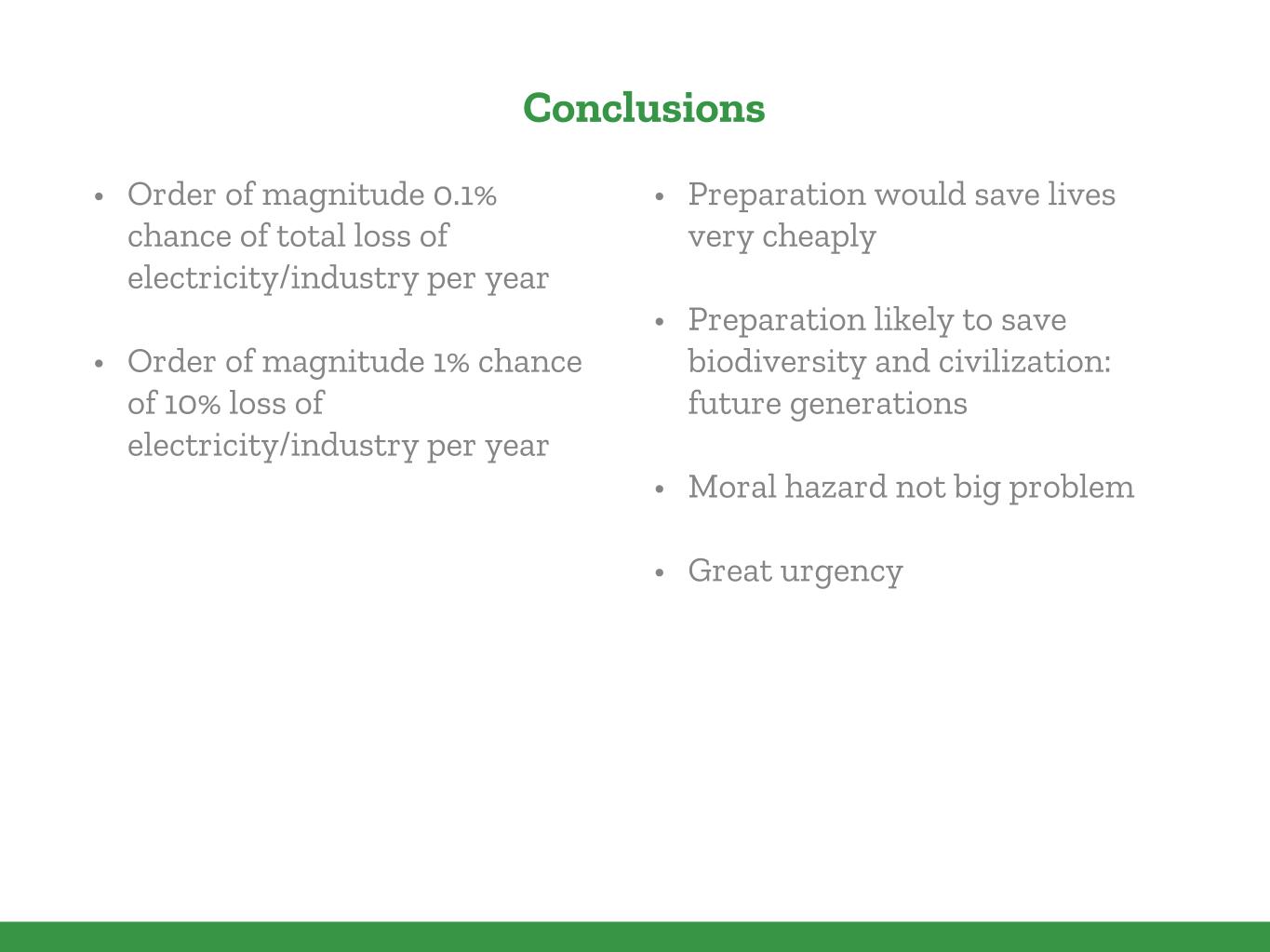
But my thinking is that if we can protect against a large part of the loss of life and potential far future impact for much less money, then that could be more cost effective, and maybe the first thing we should do.

We're going to include a PDF of this, on the website, so you'll have the guesstimate model if you're interested in doing cost effectiveness. This is just some summary. We haven't talked so much about it, but if your primary concern is the present generation, I think there is potential to save lives in the present generation as well. You could also protect biodiversity. Then if you're interested in helping out, it would be great to raise more awareness about these issues.
